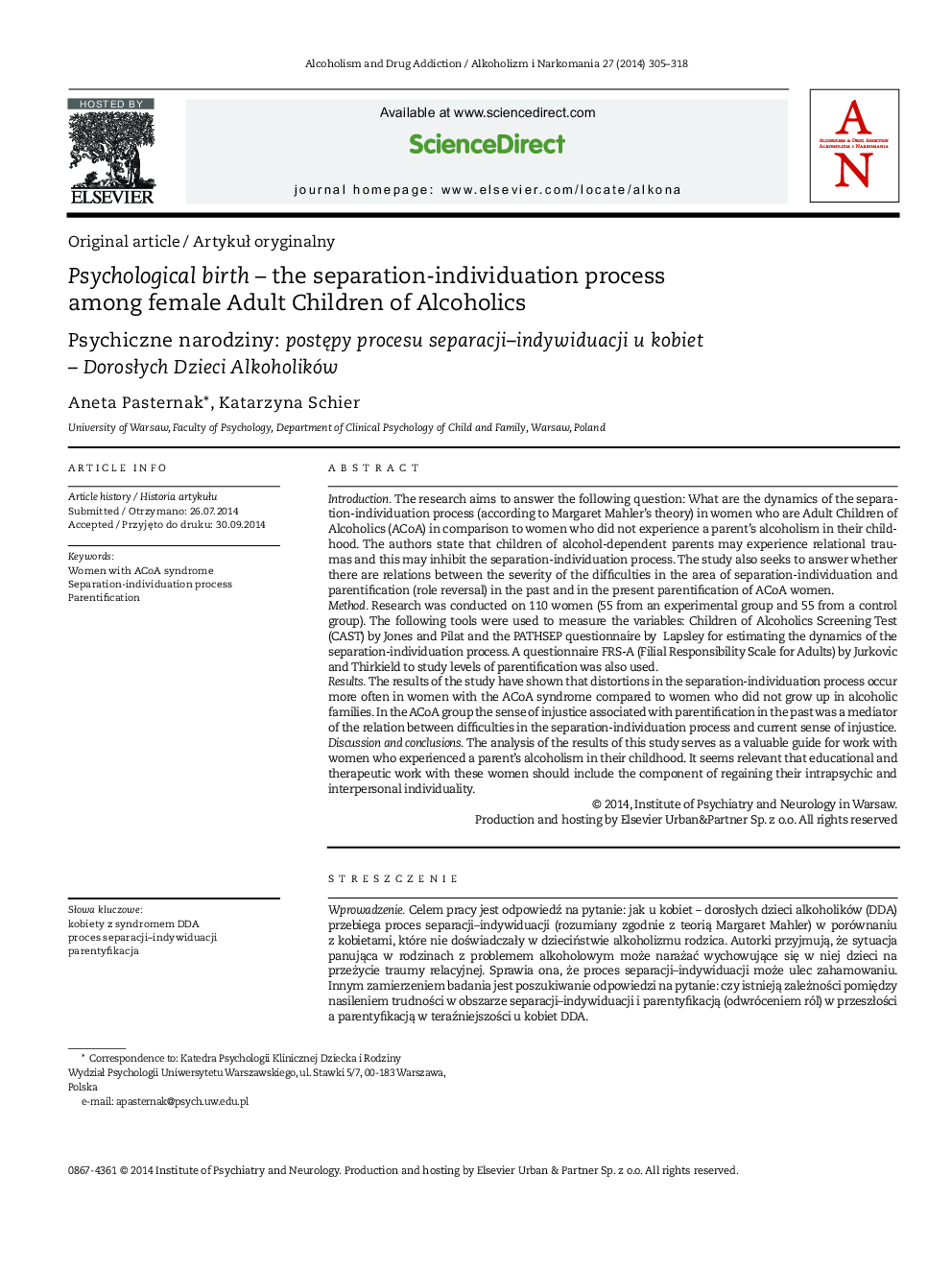| کد مقاله | کد نشریه | سال انتشار | مقاله انگلیسی | نسخه تمام متن |
|---|---|---|---|---|
| 900793 | 915620 | 2014 | 14 صفحه PDF | دانلود رایگان |
IntroductionThe research aims to answer the following question: What are the dynamics of the separation-individuation process (according to Margaret Mahler's theory) in women who are Adult Children of Alcoholics (ACoA) in comparison to women who did not experience a parent's alcoholism in their childhood. The authors state that children of alcohol-dependent parents may experience relational traumas and this may inhibit the separation-individuation process. The study also seeks to answer whether there are relations between the severity of the difficulties in the area of separation-individuation and parentification (role reversal) in the past and in the present parentification of ACoA women.MethodResearch was conducted on 110 women (55 from an experimental group and 55 from a control group). The following tools were used to measure the variables: Children of Alcoholics Screening Test (CAST) by Jones and Pilat and the PATHSEP questionnaire by Lapsley for estimating the dynamics of the separation-individuation process. A questionnaire FRS-A (Filial Responsibility Scale for Adults) by Jurkovic and Thirkield to study levels of parentification was also used.ResultsThe results of the study have shown that distortions in the separation-individuation process occur more often in women with the ACoA syndrome compared to women who did not grow up in alcoholic families. In the ACoA group the sense of injustice associated with parentification in the past was a mediator of the relation between difficulties in the separation-individuation process and current sense of injustice.Discussion and conclusionsThe analysis of the results of this study serves as a valuable guide for work with women who experienced a parent's alcoholism in their childhood. It seems relevant that educational and therapeutic work with these women should include the component of regaining their intrapsychic and interpersonal individuality.
StreszczenieWprowadzenieCelem pracy jest odpowiedź na pytanie: jak u kobiet – dorosłych dzieci alkoholików (DDA) przebiega proces separacji–indywiduacji (rozumiany zgodnie z teorią Margaret Mahler) w porównaniu z kobietami, które nie doświadczały w dzieciństwie alkoholizmu rodzica. Autorki przyjmują, że sytuacja panująca w rodzinach z problemem alkoholowym może narażać wychowujące się w niej dzieci na przeżycie traumy relacyjnej. Sprawia ona, że proces separacji–indywiduacji może ulec zahamowaniu. Innym zamierzeniem badania jest poszukiwanie odpowiedzi na pytanie: czy istnieją zależności pomiędzy nasileniem trudności w obszarze separacji–indywiduacji i parentyfikacją (odwróceniem ról) w przeszłości a parentyfikacją w teraźniejszości u kobiet DDA.MetodaBadanie przeprowadzono w grupie 110 kobiet (55 z badanej grupy i 55 z kontrolnej). Do pomiaru zmiennych zastosowano następujące narzędzia badawcze: kwestionariusz przesiewowy do badania dzieci alkoholików CAST (Children of Alcoholics Screening Test), autorstwa Jonesa i Pilat, kwestionariusz PATHSEP Lapsleya, służący do oceny zaburzeń przebiegu procesu separacji–indywiduacji oraz kwestionariusz służący do badania poziomu parentyfikacji FRS-A (Filial Responsibility Scale for Adults), autorstwa Jurkovica i Thirkield.WynikiBadania wykazały, że u kobiet z syndromem DDA w porównaniu z kobietami, które nie dorastały w rodzinie z problemem alkoholowym, częściej występują nieprawidłowości w zakresie przebiegu procesu separacji–indywiduacji. W grupie DDA poczucie niesprawiedliwości związane z parentyfikacją w przeszłości było mediatorem zależności pomiędzy trudnościami w zakresie separacji–indywiduacji a poczuciem niesprawiedliwości w teraźniejszości.Omówienie i wnioskiUzyskane wyniki stanowią wskazówkę do pracy z kobietami, które doświadczyły w dzieciństwie alkoholizmu rodzica. Wydaje się istotne, aby praca edukacyjna i psychoterapeutyczna z kobietami pochodzącymi z rodzin alkoholowych obejmowała aspekt odzyskiwania przez nie odrębności intrapsychicznej i interpersonalnej.
Journal: Alcoholism and Drug Addiction - Volume 27, Issue 4, December 2014, Pages 305–318
